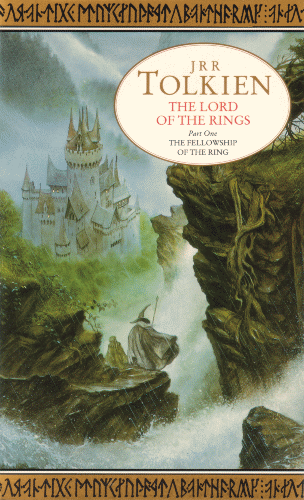In the Lord of the Rings re-read, two developments: chapter 9 of Fellowship, “At the Sign of The Prancing Pony,” and a shiny new index of all the re-read posts, which is also linked at the bottom of each post. After the jump, a chapter summary and commentary.
What Happens
The hobbits arrive at Bree in the dark. Harry the gatekeeper seems strangely interested in them, but lets them through. After he does, a dark figure climbs over the gate.
At The Prancing Pony, the innkeeper Barliman Butterbur welcomes them and encourages them to join the company in the common room after they eat. Merry declines, but the other three go. Frodo (traveling as Mr. Underhill) explains their presence by claiming to be writing a book, and then listens to Men and Dwarves talking about trouble in the South and to Pippin gossiping. A “strange-looking weather-beaten man” named Strider warns Frodo that Pippin is talking too freely. As a distraction, Frodo stands on a table—overcoming a brief temptation to put on the Ring—gives a short speech, and sings a song of Bilbo’s about the cow jumping over the Moon. During the encore presentation, he falls off the table and the Ring ends up on his finger, causing him to vanish. The local hobbits draw away from Sam and Pippin, but three men—a “swarthy” local, a “squint-eyed southerner,” and Harry the gatekeeper—leave after giving some knowing looks.
Frodo crawls to Strider’s corner, takes off the Ring, and agrees to talk to Strider after Strider implies knowledge of Frodo’s real name and the Ring. Frodo then comes back to the firelight, where Butterbur also asks him for a private word.
Comments
A deliberately transitional chapter, and though considerably less eventful than the prior, not without its tension.
It opens with an omniscient history and geography lesson, quite explicitly establishing that Bree is a step into the wider world, but only a small one. It’s much more cosmopolitan than the Shire, with Men and Hobbits living in the same community and travelers regularly stopping at the Inn; and yet that only goes so far, as the residents of Bree “did not themselves travel much; and the affairs of the four villages were their chief concern.”
I’m not sure what to make of the claims that Bree is the oldest settlement of hobbits and the home of Men since the Elder Days; it feels thematic, but I can’t quite put my finger on why. More of the relatively self-centered nature of the inhabitants, perhaps?
Or, perhaps it’s just that “Bree stood at an old meeting of ways,” making it plausible that all the relevant characters would be present there.
* * *
Ominous yet ambiguous bits:
First, the curious gatekeeper and the dark figure. This caught my eye because the description seems to deny a connection between the two:
The man stared after the hobbits for a moment, and then he went back to his house. As soon as his back was turned, a dark figure climbed quickly in over the gate and melted into the shadows of the village street.
(Emphasis added.) And yet I believe Harry is later revealed to be in league with the Black Riders. So, why would one bother to enter Bree behind his back? It’s a small thing, but not one I have an answer for.
Another ambiguity, but a consistent and deliberate one, is the Ring. When Frodo first stands on the table,
He felt the Ring on its chain, and quite unaccountably the desire came over him to slip it on and vanish out of the silly situation. It seemed to him, somehow, as if the suggestion came to him from outside, from someone or something in the room.
And later, Frodo is unsure how the Ring came to be on his hand: “perhaps it had tried to reveal itself in response to some wish or command that was felt in the room.”
I don’t buy the Ring responding to the low-level evil of the three men who later leave the room, but since Frodo doesn’t know that there’s a Rider in town, the ambiguity about the Ring’s capabilities remains for the reader.
* * *
Characterization:
Merry is again the brisk common-sense one, telling the others to mind their Ps and Qs in the common room. Pippin reverts to seeming young and careless to me here, though Frodo’s fear that he might mention the Ring might be Ring-related paranoia rather than an actual danger. Sam is basically absent except for a brief fish-out-of-water comment.
Strider, now. Meeting him again for the first time was peculiar, since the competent leader in Rohan and Gondor is how I always think of him. Here, the way he presents himself to Frodo seems much less, hmmm, politic? than my memory of his skills later on. More about this next chapter.
And the difficult issue of skin color shows up earlier than I’d remembered, with one of the suspicious types being “swarthy.” Again, more on this later.
* * *
Finally, in The Road to Middle-earth, Tom Shippey reports that the song is something Tolkien had previously published, an attempt to reconstruct the ancestor of the nursery rhyme, much like attempts to reconstruct Proto-Germanic from English, German, and so forth. It doesn’t make me any fonder of the song, but at least I understand a little better what the heck it’s doing there in the text.










